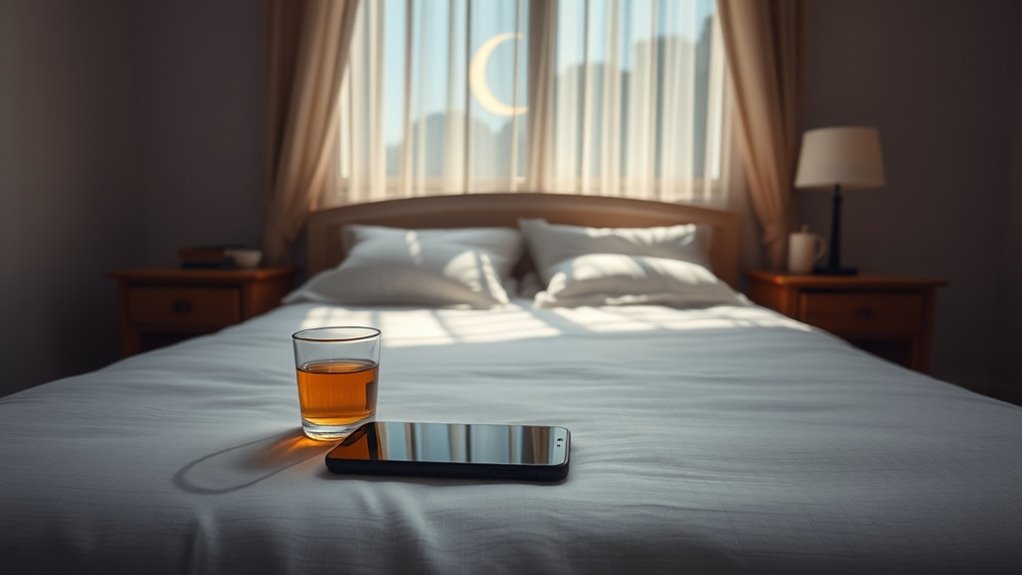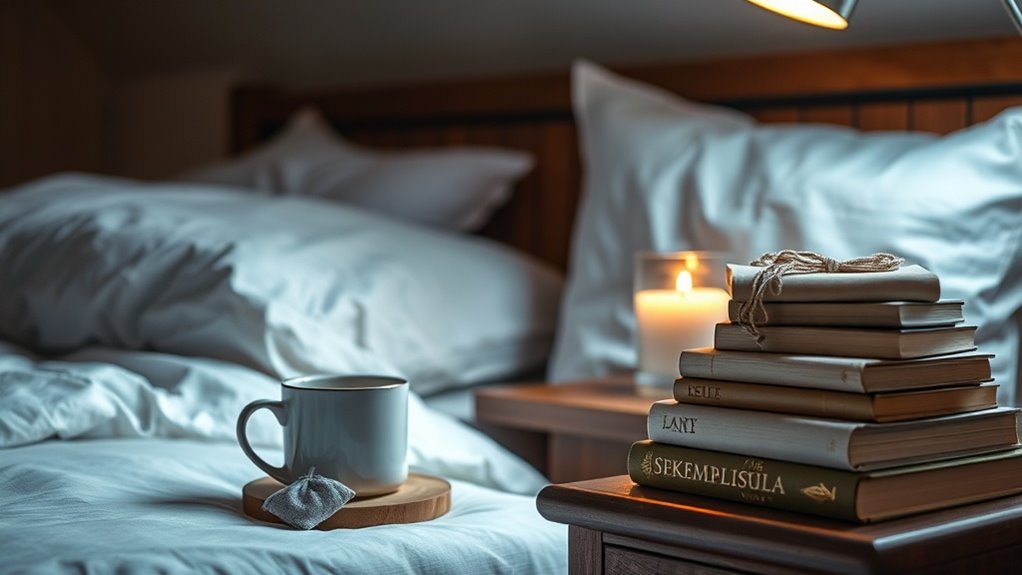This Herbal Tea + Breathing Combo Is My Go-To Before Bed
Like a warm embrace at the end of a long day, a soothing herbal tea ritual can transform your bedtime experience. Combining the calming effects of chamomile, lavender, and valerian root with mindful breathing techniques helps ease stress and promotes better sleep. This simple yet powerful approach could be just what you need for a restful night. Curious about how to incorporate this into your routine? Let’s explore the steps together.
Key Takeaways
- Enjoy a calming herbal tea blend like chamomile, lavender, or valerian root to promote relaxation before bedtime.
- Practice mindful breathing techniques, such as the 4-7-8 method, to slow your heart rate and reduce stress.
- Sip your herbal tea slowly in a cozy spot, enhancing the calming atmosphere for better sleep.
- Combine tea with deep breathing exercises to melt tension and prepare for restorative sleep.
- Establish a consistent bedtime routine featuring herbal tea and breathing techniques for improved sleep quality and refreshed mornings.
The Benefits of Herbal Tea for Sleep
Have you ever wondered how a simple cup of herbal tea can transform your sleep experience?
Integrating herbal tea into your night calm routine can significantly enhance relaxation and prepare your mind for rest.
The soothing properties of herbs like chamomile and valerian root work wonders, calming your nervous system and reducing stress levels.
Sipping tea before bed not only signals your body that it’s time to wind down but also creates a peaceful ritual that promotes mindfulness. Additionally, establishing a relaxing bedtime routine can further improve your sleep quality and overall well-being.
Choosing the Right Herbal Tea
When choosing the right herbal tea for your bedtime routine, consider popular options like chamomile, peppermint, or lavender, each offering unique benefits.
Pay attention to the flavor and aroma that resonate with you, as these can significantly enhance your relaxation experience.
Finding the perfect blend can transform your pre-sleep ritual into a soothing escape. Additionally, incorporating an evening routine can further promote relaxation and improve sleep quality.
Popular Herbal Tea Types
Exploring the world of herbal teas reveals a delightful array of options that can cater to your unique preferences and health needs.
Popular choices include chamomile, known for its calming effects, and peppermint, which aids digestion.
If you’re seeking relaxation, consider valerian root, while hibiscus offers a refreshing, tangy flavor with heart health benefits.
Ginger tea is perfect for warming up and soothing nausea.
For respiratory support, try eucalyptus or thyme.
Each tea provides distinct benefits, so consider your desired outcome when selecting one.
Experimenting with these types can help you find the perfect blend for your bedtime routine.
Flavor and Aroma Considerations
Choosing the right herbal tea involves considering both flavor and aroma, as these elements can significantly enhance your nighttime routine.
Think about what you enjoy; a soothing chamomile offers a gentle, floral note, while peppermint brings a refreshing kick.
If you prefer something earthier, try rooibos with its rich, nutty undertones.
Don’t forget about aroma—scents like lavender can promote relaxation and peace.
Experiment with blends, too; combining ingredients can create a unique profile that suits your taste and mood.
Ultimately, the right tea won’t only taste good but also provide the calming comfort you need before bed.
Mindful Breathing Techniques
Mindful breathing techniques can transform your evening routine by promoting relaxation and reducing stress. By incorporating simple breathing exercises into your night, you’ll enhance the calming effects of your herbal tea. Timing your practice just before bed allows you to fully embrace tranquility and prepare for restorative sleep. Even just five minutes of focused breathing can profoundly impact your daily life and improve your overall well-being.
Benefits of Mindful Breathing
While many people seek relaxation methods to unwind before bed, mindful breathing stands out as a powerful tool for enhancing both mental clarity and emotional well-being.
By focusing on your breath, you can cultivate a sense of presence, reducing stress and anxiety.
This practice helps to calm your mind, allowing you to release the day’s worries and prepare for restful sleep.
It also improves your ability to respond to challenges with a clearer mindset.
Incorporating mindful breathing into your bedtime routine can lead to deeper relaxation, improved sleep quality, and a more balanced emotional state, setting the stage for a refreshing night’s rest.
Simple Breathing Exercises
Breathing exercises can be a game changer for your bedtime routine, providing a quick way to calm your mind and prepare for sleep.
One effective technique is the 4-7-8 method: inhale deeply through your nose for four seconds, hold for seven seconds, then exhale slowly through your mouth for eight seconds.
This simple rhythm helps slow your heart rate and release tension.
Another option is box breathing—inhale for four seconds, hold for four, exhale for four, and pause for four.
These practices can ground you, making it easier to transition into a peaceful night’s rest.
Try incorporating them tonight!
Timing Your Practice
To maximize the benefits of your breathing exercises, consider the timing of your practice. Engaging in mindful breathing before bed can enhance relaxation and improve sleep quality. Aim to dedicate 10-15 minutes for your routine, ideally 30 minutes after sipping your herbal tea. This ensures your body is calm and receptive.
| Time of Day | Benefits |
|---|---|
| Morning | Sets a positive tone |
| Afternoon | Reduces stress levels |
| Evening | Prepares the mind for sleep |
| Before Bed | Enhances relaxation |
Incorporating these timings can transform your bedtime experience.
How to Prepare Your Herbal Tea
Preparing your herbal tea is a simple yet rewarding process that can enhance your bedtime routine.
Start by selecting your favorite herbal blend, like chamomile or peppermint.
Boil fresh water, then let it cool slightly before pouring it over the tea.
Steep for about five to seven minutes, allowing the flavors and benefits to infuse.
If you prefer, you can add a touch of honey or lemon for added flavor and health benefits.
Once it’s ready, find a cozy spot, sip slowly, and take a moment to appreciate the warmth and aroma. This sets a calming tone for your evening and creates the perfect at-home spa experience(creating a serene at-home spa experience).
Creating a Relaxing Bedtime Routine
How can you create a relaxing bedtime routine that soothes your mind and body? Start by setting a calming atmosphere with soft lighting, your favorite herbal tea, and gentle music. Incorporate these elements into your routine:
| Activity | Duration | Purpose |
|---|---|---|
| Herbal Tea | 10 mins | Winding down |
| Deep Breathing | 5 mins | Reducing stress |
| Stretching | 10 mins | Releasing tension |
| Meditation | 10 mins | Centering your thoughts |
| Journaling | 10 mins | Reflecting on the day |
Each step helps you unwind, preparing you for restorative sleep. Additionally, a soothing bedtime routine can significantly enhance your sleep quality through establishing a relaxing environment.
Personal Experience and Results
After establishing a calming bedtime routine, you might wonder about the impact it has on your overall well-being.
Integrating herbal tea with deep breathing has transformed your nights.
As you sip the warm, soothing tea, you feel tension melting away.
The gentle aroma guides your mind to a tranquil state, while focused breathing enhances relaxation, slowing your heart rate.
You’ll notice falling asleep becomes easier, and your sleep quality improves significantly.
Waking up refreshed and rejuvenated is now the norm.
This simple combination not only calms your mind but also nurtures your body, promoting a holistic approach to restful nights. Additionally, practicing a soothing breathing exercise can further enhance your sleep experience.





